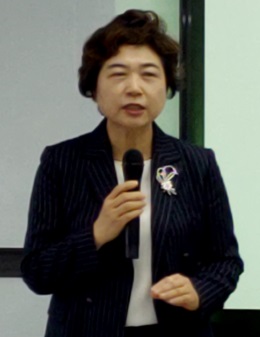“As the head of Korea Orphan and Essential Drug Center putting patients first, I will put good ideas about the organization, legislation, and budget into practice during my tenure.”
Kim Na-kyung, who recently took office as the 12th CEO of KOEDC, made this and other remarks at a meeting with reporters in Seoul, Tuesday.

he first introduced the role of the orphan drug center.
“The center’s most important task is to supply orphan and essential drugs for Korean people stably,” Kim said. Also, KOEDC collects the latest information on rare disease and related medications, builds the database, supports R&D of orphan and essential drugs, and commissions research.
According to Kim, KOEDC functions as a pharmacy, a wholesaler, an importer, and a supplier of medicines unavailable in the domestic market. The center also identifies the demand for emergency drugs such as Tamiflu and stocks them.
“KOEDC keeps its principle that it does not invade the market. As soon as a drug supplied by KOEDC wins local approval and comes out in the market, KOEDC’s involvement ends,” she said.
Kim called for an increase in the budget for KOEDC to better serve as the supplier and manager of orphan drugs.
KOEDC is managing 130 drugs for patients’ self-treatment. “When a patient applies for approval for drug use at the MFDS, it takes several months between KOEDC’s drug import and the delivery to the patient. I want to address this issue,” Kim said.
The center is trying to predict the demand for certain drugs to supply them for patients as quickly as possible, but the budget limit makes it difficult to do so, she added.
KOEDC faces difficulties in distributing narcotics in particular because many of them are unauthorized by the Korean regulator although they have won the license overseas, Kim went on to say.
The center was discussing the issue with the MFDS to persuade the Ministry of Economy and Finance to secure a budget for the stocks of such opioid drugs, she added.
KOEDC is supplying only two narcotics drugs – cannabidiol (CBD) for epilepsy treatment and dextromethorphan.
Kim also vowed to broaden orphan drug accessibility for patients with rare and incurable diseases.
While the world has designated over 10,000 rare diseases, Korea has named only 1,040 rare diseases, according to Kim. KOEDC will discuss with the Ministry of Health and Welfare to designate more rare diseases and improve orphan drug accessibility, she said.
“While the WHO designated over 500 essential national medicines, Korea has only 403 essential drugs,” she said. “By collaborating with the WHO, we will look at areas that require a new designation or deletion, and prepare measures to benchmark a well-established system from overseas.”
Kim graduated from Daegu Catholic University College of Pharmacy and earned a Ph. D in pharmaceutical and medicinal chemistry from the University of Kiel in Germany.
She joined MFDS in July 1996 and has served as director of the pharmacology division, director of the digestive medicines division, head of the cosmetics research team, director of the pharmaceutical standards division, head of the drug evaluation department, and head of the MFDS’ Daejeon branch.

